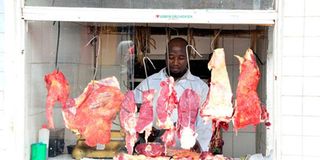Government moves to enforce quality meat standards for abattoirs

A butcher chops meat for a customer in Nakasero Market in Kampala. Consumers have been told to be cautious when buying meat from local butcheries.
What you need to know:
Objective. The move is meant to boost cosumption on safety grounds.
Kampala. Government is planning a massive crackdown on abattoirs and butcheries that do not maintain minimum hygiene requirements, Daily Monitor has learnt.
The decision by the Trade ministry is informed by the need to strengthen declining meat handling standards across the country.
If this is done properly, senior industrial officer at the Trade ministry, Mr Peter Odong, said the quality of products such as beef will be guaranteed, let alone boost consumption on safety grounds.
The crackdown will be done after personnel involved in meat handling including flaying and dressing staff, meat inspectors, graders of meat and supervisors on meat hygienic practices have undergone short training courses on hygienic practices and the need to maintain standards.
Mr Odong, who is also the programme officer for Quality Infrastructure and Standards Programme at the ministry, confirmed the development in an interview early in the week. He said: “We are now training junior employees who directly handle meat and transact with the customers directly and not the managers or owners who are not directly involved in running the business.”
He continued: “We don’t want to take chances. Other than using shortcuts to keep away flies, we want to teach them how to keep proper hygiene both in the tools they use and their surroundings. And after that we are going to strengthen regulation. Those that will be caught outside the law will blame no one but themselves.”
Why the standards
In her presentation in Kampala last week, the Uganda National Bureau of Standards (UNBS) standards officer, Ms Moreen Were Wejuli, said meat is a high-value traded commodity whose standards must be observed.
This, she said, is done to safeguard the population against meat borne diseases, boost public confidence in the product and also enhance both domestic and export market.
Responding to the need for proper hygiene and clamping down on those who will come short of the required standards, the managing director Nsooba Slaughter House, Capt Dennis Aubbery Saazi, said the problem is not hygiene as there has been improvement over the years in that regard.
According to him, the problem is lack of facilities to enhance mass transaction rather than properly looking after the product.
He said: “What we want is a loan from government with a fair interest rate so that we establish modern facilities and do business on a large commercial scale.”
Handling hygienic standards include an annual health certificate, portable water supply, wash rooms, sewage disposals, medical certificate to show absence of contagious diseases and personal hygiene—no long nails and jewelry.




